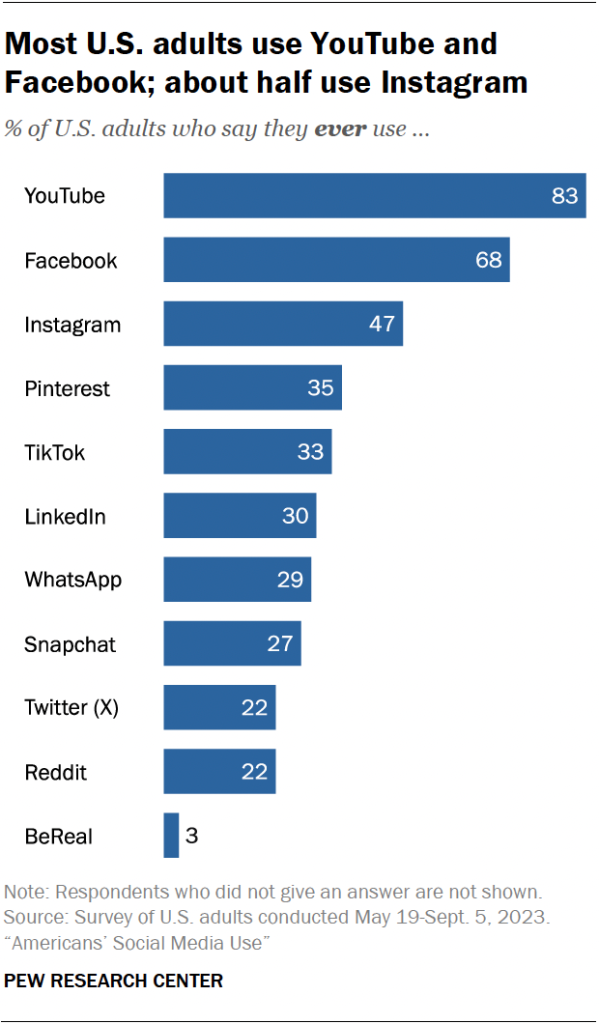
Bessette/Pitney’s AMERICAN GOVERNMENT AND POLITICS: DELIBERATION, DEMOCRACY AND CITIZENSHIP reviews the idea of "deliberative democracy." Building on the book, this blog offers insights, analysis, and facts about recent events.
A small but growing share of U.S. adults say they regularly get news on TikTok. This is in contrast with many other social media sites, where news consumption has either declined or stayed about the same in recent years.
In just three years, the share of U.S. adults who say they regularly get news from TikTok has more than quadrupled, from 3% in 2020 to 14% in 2023.
TikTok, primarily known for short-form video sharing, has become especially popular among teens – two-thirds of whom report ever using the platform – as well as young adults.
32% of U.S. adults ages 18 to 29 say they regularly get news on TikTok, a higher share than in years before. This compares with 15% of those ages 30 to 49, 7% of those 50 to 64 and just 3% of those 65 and older. Dive into our findings: https://t.co/RqAYRRyLKw pic.twitter.com/iKXMTpqL0A
— Pew Research Center (@pewresearch) November 16, 2023
Some social media sites stand out for having high shares of users who regularly go to the site for news: 43% of TikTok users regularly go to the platform to get their news, up from 22% in 2020. Dive into our state of the news media fact sheet: https://t.co/b4E6Hk3gAu pic.twitter.com/ov19U3v924
— Pew Research Center (@pewresearch) November 17, 2023
Montana has banned TikTok, which is suing.
119. The Commerce Clause of the U.S. Constitution grants Congress the power to regulate commerce with foreign Nations, and among the several States. U.S. Const. art. 1, § 8, cl. 3. While the Commerce Clause is framed by its text [as] an affirmative grant ofpower to Congress , the so-called Dormant component of the Clause has long been recognized as a self-executing limitation ofthe States to enact laws imposing substantial burdens on [interstate] commerce ." South-Central Timber Dev.,Inc. v.Wunnicke ,467 U.S.82 ,87 (1984).
120. The TikTok Ban imposes substantial burdens on interstate commerce inviolation of the Commerce Clause and other structural provisions ofthe Constitution by prohibiting Plaintiff from operating TikTok in Montana and penalizing Plaintiff any time a user in Montana accesses TikTok or is offered the ability to access or download TikTok in the State . The TikTok Ban is not limited to Montana residents ; it applies to anyone in the State ,including those visiting or merely passing through for work.
121. Substantial burdens on interstate commerce generally result from inconsistent regulation ofactivities that are inherently national or require a uniform system of regulation. Bernstein v.Virgin Am.,Inc.,3 F.4th 1127, 1135 (9th Cir. 2021) (quoting Nat'lAss'n of Optometrists & Opticians v. Harris,682 F.3d 1144, 1148 (9th Cir.2012)).
122. Plaintiff's operation of TikTok ,an application used by over 150million users in the United States ,including in every State, is inherently national in scope and requires a uniform system of regulation, not one subject to the policy decisions offifty separate States.
Many posts have discussed social media sites and their political impact.
A small but growing share of U.S. adults say they regularly get news on TikTok. This is in contrast with many other social media sites, where news consumption has either declined or stayed about the same in recent years.
In just two years, the share of U.S. adults who say they regularly get news from TikTok has roughly tripled, from 3% in 2020 to 10% in 2022.
The video-sharing platform has reported high earnings the past year and has become especially popular among teens – two-thirds of whom report using it in some way – as well as young adults.